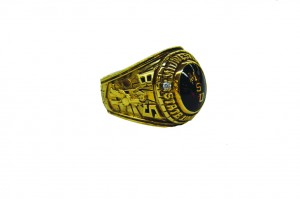
MSU has spent $75,248 on championship rings for student athletes over the past five years, more than a quarter of it – $20,358 – coming from the student body at large.
In most cases, donor money financed the purchases of rings for sports teams, but administrators dipped into athletic fees paid by students twice in 2007 and three times in 2011. The Wichitan obtained records about spending on rings through state open records statutes this semester.
Charlie Carr, athletic director, expressed surprise when told that athletic fee money was used to buy rings. He said the money was “never intended” to be used like that.
“The intent is that the money comes from donors,” Carr said.
He said that athletic fee money used was probably replaced later on with donor funds. There is, however, no record of this.
“I wouldn’t have a problem with it if the funds were available,” Carr said. “But they’re not.”
But Juan Sandoval, vice president of business affairs and finance, held the opposite view. He said he prefers to use athletic fee money as opposed to donor funds or tuition to purchase the rings.
“The use of athletic fee funds is great if you have it,” he said.
Athletic fee money was treated differently when it was used to buy rings in 2007. In 2008, the student body voted to make the athletic fee a freestanding fee. Before that it was contained within the Student Services fee.
In most cases, though, athletic fee money hasn’t been available. Private gifts have bought the majority of sports rings since 2007.
If private money weren’t available, Sandoval said, he would be forced to use designated tuition for the purchases.
“Are the rings necessary? I think so,” he said.
An invoice shows MSU paid Graduate Sales at 906 Denver St. in Wichita Falls $5,694 for 26 championship rings on Aug. 28, 2007. Each ring cost $219. The same company billed $4,100 for 25 championship rings for the girl’s softball team that same year. Each ring cost $164.
In 2011, JLewis Small Company in Elwood, Ind. charged $1,668 for 12 white alloy rings, each valued at $139. Thirty-two men’s and 32 women’s soccer championship rings cost $8,896. Each ring was valued at $139.
A team must win the Lone Star Conference to be awarded a ring. A team that wins the Super Regional wins a different type of ring than a team that wins a national championship.
“That’s their reward,” said President Dr. Jesse Rogers.
Donors of the President’s Excellence Circle, who contribute at least $1,000 to the university, gave $30,516 since 2007 for rings.
“Many people who belong to the PEC give significant money to athletics,” Rogers said.
